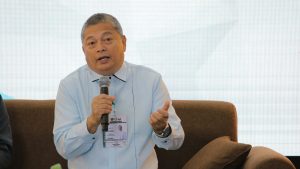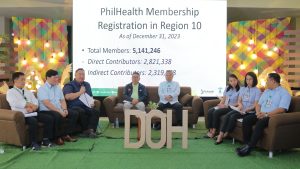CAGAYAN DE ORO CITY (PIA) — Health care services are now without borders as more health services are accessible even at the community level, a result of the implementation of the Universal Health Care (UHC) law to improve the health care system in the provinces and cities in Region 10.
Dr. Sulpicio Henry M. Legaspi Jr., regional director of the Department of Health, Center for Development in Northern Mindanao (DOH-CHDNM), stated during the sixth episode of Kapihan sa Bagong Pilipinas by PIA-10 that the Universal Health Care (UHC) law has resolved issues such as the lack of doctors, hospitals, rural health facilities, ambulances, transportation for patients, and funds for consultations.

As of May 2024, the total number of completed health infrastructure projects across Northern Mindanao is 116, with 97 barangay health stations, 13 super health centers, 1 hospital, 1 TB DOTS facility, 1 regional blood center, 1 rural health unit, 1 temporary treatment and monitoring facility, and 1 RESDRU warehouse amounting to P605.4 million in total cost.
Further, DOH-CHDNM has recently inaugurated the Northeastern Misamis General Hospital, located in Villanueva. The project’s contract amounted to more than P395 million.
Legaspi shared that this hospital will accommodate patients on the eastern side of Misamis Oriental and seeks to decongest the Northern Mindanao Medical Center. Meanwhile, Misamis Oriental Provincial Hospital in Manticao serves the province’s western side.
In terms of transportation for patients in emergencies, DOH-CHDNM has donated 42 land ambulances across the region; meanwhile, 17 land ambulances were turned over as of April 2024.
“Halos tanan RHU [rural health unit] naa’y ambulance, so dili na magproblema, even MDRRM [municipal disaster risk reduction management offices] naa’y ambulance, all we have to do is strengthen our referral system (Almost every RHU has an ambulance, so there will be no more problems; even MDRRM has an ambulance, all we have to do is strengthen our referral system),” he said.
In terms of consultations, Legaspi emphasized that through the Konsulta Package of PhilHealth, anyone can avail of a consultation free of charge as long as the patient goes to a PhilHealth-accredited facility and is also enrolled in the program.
“Dili na problema ang pagbayad kay ang PhilHealth magbayad man sa health facility. Philhealth has the budget nga mubayad or mureimburse sa inyong payments karon libre laboratory, libre pa tambal, atong mga ka igsuonan ato gyud gi-encourage nga muadto didto sa pinakaduol nga health facility,” he said.
(Payment is no longer a problem because PhilHealth will pay for the health facility. PhilHealth has the budget to pay or reimburse your payments now, free laboratory, free medicine; we really encourage our brothers and sisters to go to the nearest health facility.)

Regional Vice President Delio A. Aseron II announced during the forum that 106 facilities, with over 1,964,261 registered clients, have received Konsulta accreditation.
“Through PhilHealth Konsulta, wala nang kababayan na papanaw na hindi nakapagpatingin sa isang doctor (no Filipino will die that has not been consulted by a doctor),” Aseron said.
He urged more Kagay-anons and Northern Mindanao residents to register at the nearest Konsulta facilities.
Republic Act (RA) 11223, or the Universal Health Care (UHC) Law of 2019, provides a systematic approach and clear delineation of the roles of key agencies and stakeholders in improving health system performance and guaranteeing equitable access to quality and affordable healthcare.
“What we are trying to say here is that we will be pursuing this together with PhilHealth and, of course, our media partners and other government agencies; we are one in pursuing this through Universal Health Care,” Legaspi said. (JMOR/PIA-10)













